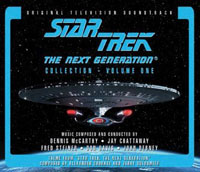Journey's End
This story begins a sequence of wrap-up episodes leading to
the end of "The Next Generation" series on TV, most of which
deal with tying up the loose ends of the story arcs
of the more minor recurring characters on the show.
Of course, Wesley Crusher used to be much more than that
once upon a time, but that has become his status now.
Although, yes, he still has something to learn about manners,
not to mention
seeking first to understand before
seeking to be understood,
it is nice to see here that he's largely outgrown Starfleet
and its limiting chain of command concepts. One wonders
a bit why it took so long to figure out. Wesley basically got
a huge demotion to go from Full Ensign (as achieved in
season three's Ménage à Troi") down to Cadet
for several years. How can he not feel like he's being
held back and dumbed down? Moving on with the Traveler
is far more interesting. It is hugely disappointing to
see this evolution of Wesley largely forgotten in
the tenth feature film "Nemesis"
(albeit in deleted scenes only),
where he is turned once more into the boring Starfleet puppy
conveniently wagging his tail and going nowhere of interest.
The bigger A-plot story here involves a new Federation-Cardassian
treaty and border re-alignment, and how that will push around
some Native Americans who have settled on a planet now on the
"wrong" side of that border. Of course this is done to make
an outer space metaphor for some of the issues that Native Americans
still struggle with today. The problem is that Star Trek's
Federation already supposedly has enough safeguards in place
to ensure that this kind of thing doesn't recur, not least of which
are some of the various permutations of the Prime Directive.
As the episode progresses, the philosophically correct solution
seemed quite obvious to me, and I was preparing to make a case
for it in my review. Then to my surprise, the episode actually
delivered the good solution at the end. So the real remaining
question is, why the hell did it take the main characters so much
time and dramatic energy to figure this out?
The red flags go up right at the beginning when the nicely
recurring character of Admiral Nechayev outlines the situation
with the border.... which exposes a big hole in the logic
of the governing bodies of Star Trek's galaxy. Exactly what is
the relationship between this group of Native Americans trying
to establish a colony on the planet and the Federation at large?
How is it that the Federation can bargain on their behalf,
and come to a decision about the status of the planet they live on
that goes completely against their wishes? This is pretty
crappy representation, taking its cue a bit too firmly from
today's Western Democracies, and suggesting that groups like
the Native Americans here will end up putting their energies into
a fight against the system's publicly announced cover story,
while failing to change any of the minds of those in control because
their real motivations are part of a hidden agenda that doesn't
begin to get challenged, much less revealed.
The feature film "Insurrection" gets that part
of the dynamic right; "Journey's End" doesn't dig deep enough for
us to find out.
In fact, it feels a bit too obvious that this particular "peace" treaty
was really designed to create conflict and fester injustice.
The parallels with our own political world today only serve to suggest
that somewhere high above Nechayev in the upper echelons of Federation decision-making
lies something corrupt and psychotic and deserving of being torn down.
On the flip side of reality, the Star Trek writing staff really do want to create
long-term conflicts to fuel their stories, in particular to have
a new "Maquis" group to help populate the upcoming Star Trek: Voyager series,
at the heart of which is the belief (right or wrong) that conflict is a requirement
for them to make their writing efforts succeed week after week.
To what extent is this kind of media diet itself restlessly psychotic?
Okay, once we get past the bizarreness of the border arrangement,
the next thing to wonder about is why Starfleet is trying to
force the Native American group one way or the other. After all,
if you can't apply the best elements of the Prime Directive
(like respecting others' wishes) to your interactions with
people within your own Federation, how are you going to be
any good at respecting the wishes of those outside of your
Federation? Or are you still unsophisticated enough that you
believe your only choices are to be interacting like
bulls in a china shop, or to not interact at all?
Really, Picard and company should just be about informing
the Native American people that the borders have shifted,
and the planet will no longer enjoy the protection of Federation Law
or Starfleet muscle. If they want to relocate, Starfleet
help is available. If they want to stay and take their chances with
Cardassians, let them. By all means, let the Cardassians be
the thing that prods these people to move. Don't try so hard to
become the prods yourself, it just makes you into jerks,
and threatens to turn genuine help into a process of "enabling"
the Native Americans to continue reliving a cultural issue that
would be about 900 years old by the time period
that this episode is set in.
Is Nechayev or her higher ups forcing Picard and crew to perform
this evacuation? If so, Wesley's actually got the right idea.
Be completely honest with the Native Americans. Resign your
commissions. Nicely, Picard does seem visibly rattled when
Wesley resigns his, and he has to dig deeper into his own soul
to figure out if he is really doing the right thing here.
Perhaps he and his crew should resign their commissions too
if forced into this. The feature film "Insurrection" got this
part right, but "Journey's End" did not. And indeed, if
Nechayev herself really is as sympathetic to Picard's objections
as she seems to have become, perhaps she'll resign her commission
as well. This kind of thing can have positive domino effects,
until the idiot decision makers have no structure left under their
command, prompting them to do a better job of making decisions
in the first place.
|
Lastly, we are forced to look at the spiritually-informed
decisions of the Native Americans. Here on Earth at least,
they have an obvious claim to the land that predates that of
the European conquerors by at least several hundred years,
if not thousands of years. But "Journey's End" has to do a few
backflips and somersaults to try to recreate something similar
now on an outer space colony. These Native Americans have only
found their ideal on the planet Dorvan Five just 20 years ago.
Just twenty years! Barely one generation ago at most, if that.
To compensate, it is said that they've been searching for 200 years
to find a place as ideal as this, one with intangible elements
like having the mountains and rivers and trees welcome them in
just the right way. Well, great. It is nice that the environment
is so welcoming. But before the obvious hits you like a sledgehammer,
perhaps it would be useful to remember that the Cardassian Empire
is part of that Environment. How welcoming are they? It's hard
to make a case of a perfect environment if the mountains
and trees are of one opinion while the Cardassians are of another.
If the Cardassians are nasty enough to kick the Native Americans
out, perhaps it isn't such an ideal environment after all,
and the search must continue.
|
|
6:08 of Jay Chattaway's evocative score for "Journey's End"
is available here:
|
|
Of course, the Starfleet characters will have no way to figure
this out and make comment on it until they get themselves out of
the way and let the Cardassians and Native Americans negotiate
and work things out between themselves - as the Prime Directive
would suggest. For once, it would be useful in this episode's
situation, yet seems to have become forgotten in name and in spirit.
And in the end, as far as we can tell from this episode alone,
the Native Americans seem to have gotten their spiritual intuitions
correct about the entire environment, even if the Cardassians don't
realize how they really feel at first.
Of course, the episode eventually gets to all the good and correct
stuff in the ending, but it really feels tacked on. Structurally,
we spent most of the story watching our Starfleet regular characters
locked on the idiotic side of the issue, where we are unable to
really root for them and invest in their goals and struggles.
Wesley may be a bit closer to the correct side of the issues,
but he's kind of clueless in his ability to know what he's
really all about in this episode, much less articulate it
for the audience. One can only imagine that the more interesting
points that I've made here did crop up, perhaps only subconsciously
and definitely off-screen, allowing our characters to come to the
excellent conclusion that we eventually get. But why spend the
cameras' time and the dramatic energy of the episode
on the less interesting stuff while the good stuff was ignored?
The sixth season episode "The Quality of Life"
had the knack of knowing exactly which
scenes and philosophical debates to put on screen at any one time.
"Journey's End" features equally fascinating ideas, but does not
manage to put the best exploration of those ideas on screen.
Preemptive Strike
For years I had sidestepped a full review of the penultimate TNG episode
"Preemptive Strike",
content to just compare it to "Journey's End" in this one paragraph here.
"Preemptive Strike" sees the recurring minor character
of Ensign Ro tying up her tour of duty on The Next Generation as
well. That episode basically brings up all the same issues
again, only with one basic difference. Here the Native Americans
are wise enough to make their own peace with the Cardassians.
The Maquis are too militant, and put their energy into a
less evolved method of claiming their space. In both cases however,
the episodes produce little reason for the audience to want to
side with the regular Starfleet characters, and really depend
on the fact that we've grown accustomed to siding with them
over the past seven seasons of their show. Of the two, I think
"Journey's End" is the superior episode - clearly in its handling
of philosophical issues at least.
Well, there's now more to say about "Preemptive Strike"
when we get to its review proper further below...
In addition to spending time on scenes that were not the most
interesting ones that actually occurred during "Journey's End",
the actual wrap-up of Wesley's arc is a bit wet and off-point as
well. Just when you think his instincts might have got him
fully emotionally engaged in the most dramatic part of the
3-way political struggle of the episode's A-plot, it is instead
reported that he actually disengaged from
the entire time/space/choice continuum altogether. This doesn't
actually make any sort of good sense. If he wants to meditate
his way into a new time/space paradigm, as we saw in both
of the Traveller's previous adventures,
fine. If he wants to
step into some kind of technological device to go to a new
time/space paradigm, fine. If he wants to scream injustice
and run onto a battlefield, that says he's going to lock himself
into our normal time/space/choice continuum on a lower vibrational
frequency and probably get his naive butt kicked. Whatever.
Writer Ron Moore should really research these things more carefully
before attempting to put them on screen... and maybe he does these
days. Back then, we were all reaching for such things without really
knowing what we were doing, and it kind of shows in this reminder
of the early 1990's.
At least the episode leaves off with everyone in a good place,
even if there is much to be desired in the portrayal of how they got
there. Interesting ideas and philosophy have been brought up,
triggering interesting discussions after the fact. I'd say this is
a good piece of art, though not as refined as what Next Gen. had done
in earlier seasons. I still like this story, despite its obvious
room for improvement.
|
|









 (regular)
(regular)



